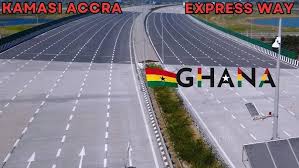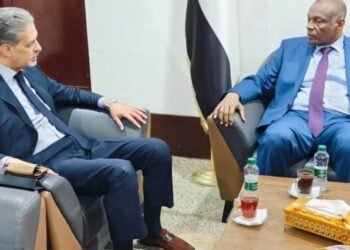The Government of Ghana has initiated feasibility studies for a new Accra-Kumasi Expressway, a strategic infrastructure project aimed at significantly reducing travel time between the country’s two largest cities while enhancing safety and supporting economic transformation.
Minister for Roads and Highways, Hon. Kwame Governs Agbodza, disclosed this during the Government Accountability Series, where he highlighted the bold steps being taken to lay the foundation for future-oriented road development in line with the administration’s “Reset Ghana” agenda.
“Let me repeat, it’s a new alignment. It is not an expansion of the existing road. It’s not the dualisation of the existing road. This is a green field—building a brand-new expressway. It will probably be the first time in our history that we do something on this scale.”
Minister for Roads and Highways, Hon. Kwame Governs Agbodza
The Accra-Kumasi corridor remains one of the most vital transport routes in the country, serving as the main artery for economic activity between the southern and northern sectors.
However, years of congestion, frequent accidents, and deteriorating road quality have long made the route a source of concern for commuters and businesses alike.
The new expressway, according to the Minister, is a critical intervention to support Ghana’s long-term transport network resilience, boost regional integration, and enable the infrastructure base necessary for the rollout of the 24-hour economy policy being championed by the government.

The Accra-Kumasi Ring Roads
Beyond the Accra-Kumasi Expressway, Hon. Agbodza revealed that the Ministry is also conducting feasibility and design studies for two other key road projects: the Accra Outer Ring Road and the Kumasi Outer Ring Road.
These projects are expected to help decongest both urban centres and create more efficient traffic flow for transit vehicles and commercial transporters who do not necessarily need to enter the city centres.
“These are not just about easing urban traffic; they are part of a broader vision to create a seamless road transport network that can support our developmental agenda for the coming decades”.
Minister for Roads and Highways, Hon. Kwame Governs Agbodza
Adawso-Bunso and Ekye-Amanfrom Bridge
Another significant project being appraised is the Adosu-Echi Amanfo Bridge, which aims to connect the Afram Plains to surrounding regions, opening up vast swathes of fertile agricultural land for commercial exploitation.

The bridge is expected to serve as a critical connector for food production zones to consumer markets, thereby enhancing agricultural productivity and improving rural livelihoods.
Hon. Agbodza remarked that this project, too, aligns with the government’s push for regional equity and infrastructure-led job creation.
“This bridge will unlock the immense agricultural potential of the Afram Plains, one of the least accessed areas in terms of road connectivity. It is a game-changer for food security and rural development.”
Minister for Roads and Highways, Hon. Kwame Governs Agbodza
Hon. Agbodza was clear in stating that these upcoming projects are not haphazard promises but carefully studied, evidence-based initiatives being pursued with a long-term development vision.
“The pipeline projects are in alignment with the Reset Agenda’s focus on long-term planning, regional equity, and infrastructure-driven job creation”.
Minister for Roads and Highways, Hon. Kwame Governs Agbodza
He reiterated that these projects are also being designed to meet the enabling infrastructure requirements for the 24-hour economy, ensuring that goods and services can move efficiently across the country at all times.

The move to begin feasibility studies before awarding contracts also reflects a departure from past practices, where road projects were sometimes initiated without proper technical assessments or secured funding.
According to the minister, the new approach prioritises planning, costing, and financial sustainability. The decision to create a completely new Accra-Kumasi Expressway—rather than simply expanding the current road—is a bold but necessary step to futureproof Ghana’s transportation system in the face of rising vehicle numbers and growing economic activity.
In wrapping up his remarks, Hon. Agbodza expressed confidence in the government’s ability to deliver on these major infrastructure ambitions.
READ ALSO: GSE Investors Rattled as IIL Bleeds and Turnover Plummets 96%



















